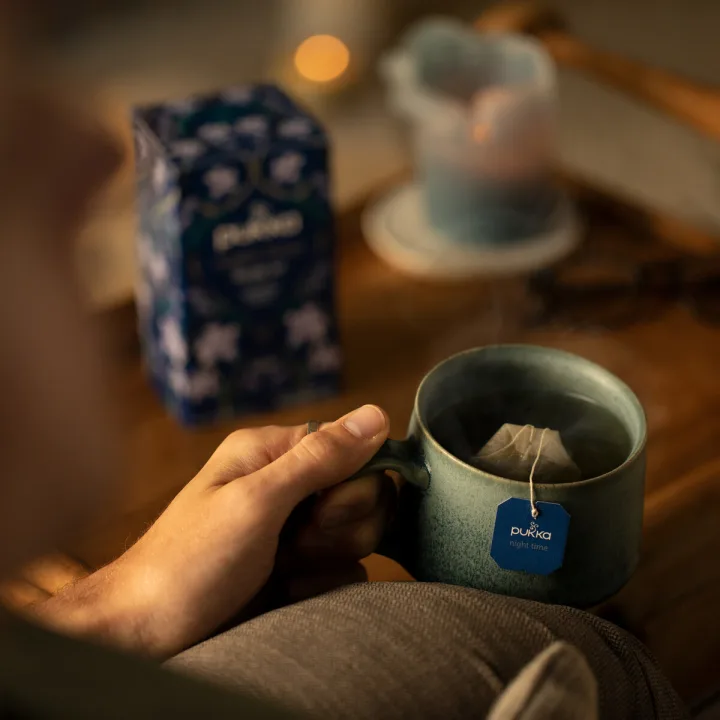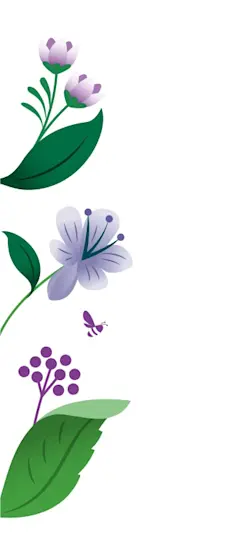

Herbs to help you sleep
We all know the importance of a good sleep, so when insomnia kicks in and you struggle to drift off, or find yourself waking up throughout the night, it can quickly start to affect day-to-day life.
In fact, sleep is as vital for our health and immunity as eating well and exercising. Thankfully help is at hand for those suffering from insomnia or sleepless nights. Holly Huntley, Pukka's Herbal Education Specialist, reveals the 7 plants and herbs that can help us to relax. Read on to find out more or watch the video above for three simple tips to help you sleep.


Natural sleep aids
Natural remedies and herbal drinks can support and encourage the mind and body’s natural processes before and during sleep, to help us have a restful night. Whether you’re trying to adapt to a new sleep pattern, or just need to get a good night’s kip, there are herbs and plants that have a longstanding use for nourishing the nervous system and helping us relax.

Here are some of the best herbs for sleep:
Lavender
This violet wonder is high in essential oils that relieve stress and improve sleep. Lavender’s relaxing effects are considered to be largely due to the essential oils present, whether inhaled, ingested or applied topically. Use Lavender oil to make home made shower melts or a pillow spray. This fragrant flower can be found in our Night Time and Love teas.
Chamomile flower
It’s not just lavender that provides relaxing essential oils; chamomile flower does too. These oils help calm our ‘fight or flight’, sympathetic nervous system, improving sleep quality. Chamomile flower also contains an antioxidant called apigenin, said to help calm an anxious mind. What’s more, chamomile tea has traditionally been used to ease digestive complaints linked to nervous conditions. Here at Pukka we love Chamomile and include it in blends such as Three Chamomile, Love, Night Time and Relax.
Oats
A small bowl of porridge an hour before bedtime might not be the worst idea. Oats have been traditionally used to recover from stress-induced nervous fatigue and to aid restful sleep.
Valerian
Valerian has been used by people for thousands of years. Even today, it's remarkably calming effect is a great comfort to people struggling with everything from sleep and insomnia to nervous anxiousness. This is one of our favourite herbs for sleep and can be found in our much-loved organic Night Time tea. Interestingly, many cats also love the smell of this herb and its affects are similar to catnip.
Nutmeg
Not just for Christmas, this warming spice has a reputation for its settling and calming properties in both traditional Indonesian herbal medicine and Western herbal medicine. It’s said to help you stay asleep as well as fall asleep.
Cinnamon
Cinnamon provides a gently warming, sweet yet sugar-free flavour while helping improve blood sugar levels. Sleep deprivation increases cortisol levels, which can cause increased rates of insulin resistance; the leading cause of type 2 diabetes. Cinnamon is said to prevent this insulin resistance, as well as helping improve glucose tolerance. Cinnamon has also been said to improve indigestion, which can often end up keeping us awake at night. Try having a warming cup of Pukka's Three Cinnamon tea or sprinkle some over your pre-bed bowl of porridge and drift off peacefully.
Ashwagandha
A tonic root used to help the body under long-term stress, ashwagandha can help with sleep. Ashwagandha improves energy and cognition by acting on relaxing neurotransmitter systems and protecting brain cells from damage. As stress is a huge factor in raised cortisol levels, helping to keep stress under control will be a huge factor in boosting sleep quality.

Author: Dr Vivien Rolfe
Head of Herbal Research
Viv is a gut physiologist and has recently achieved a Foundation in Herbal Medicine. She leads Pukka’s research programme to explore how herbs can benefit our health and be used to widen healthcare choices. This includes research into herbs for Women’s health and as alternatives to antibiotics. She establishes global research partnerships and enthuses the next generation of scientists through Pukka’s Scholarship Scheme. She is a champion of diversity in science and open access to knowledge.
Qualifications:
BSc, PhD, PFHEA
Years of experience:
30+ years in the wellbeing industry and academia
Education:
Degree in Physiology University of Sheffield, PhD University of Sheffield, Foundation in Herbalism Heartwood, MBA Entrepreneurship (on-going) Edinburgh Napier University, Principal Fellow of the Higher Education Academy.
Professional Registrations:
Membership of Nutrition Society, Physiological Society, Society for Chemical Industry, and other herbal and botanical groups.
